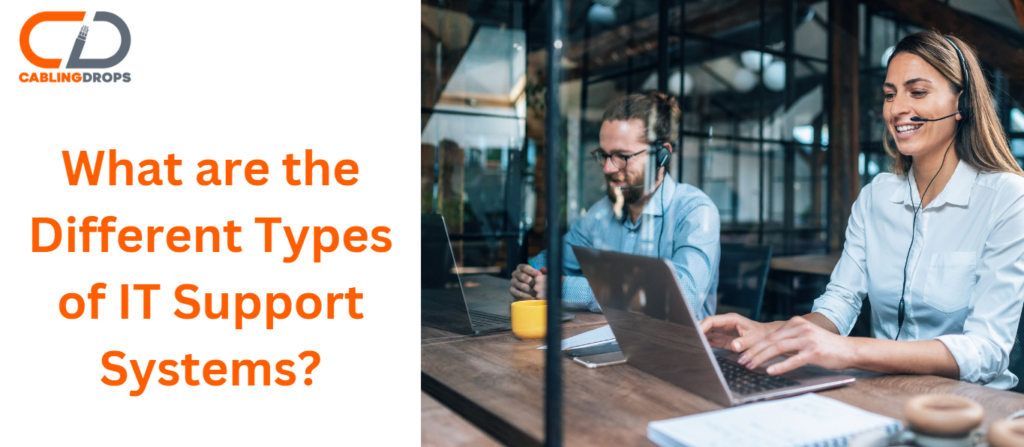
Request A Quote Today!
"*" indicates required fields
Businesses and organizations in today’s digital landscape rely significantly on information technology (IT) to improve efficiency, streamline operations, and keep a competitive edge. However, as IT infrastructure becomes more complicated, support systems become necessary to keep everything running smoothly and effectively handle technical problems. In this blog post, we explore the many kinds of IT support systems, their importance, and the advantages they provide for various sectors.
What is an IT Support System?

An IT support system encompasses a range of services and resources designed to assist users with technical issues related to hardware, software, networking, cybersecurity, and more. It acts as a lifeline for organizations, providing timely assistance and troubleshooting to minimize disruptions and optimize IT performance.
Exploring the Types of IT Support Systems
Hardware Support
- Hardware support constitutes a fundamental aspect of IT support systems, focusing on addressing issues related to physical components such as computers, servers, printers, and networking devices. Whether diagnosing hardware malfunctions, replacing faulty components, or optimizing system performance, hardware support ensures the smooth functioning of essential IT infrastructure. Furthermore, hardware support technicians possess hardware configuration, installation, and troubleshooting expertise, enabling them to resolve issues efficiently and minimize downtime.
- In addition to reactive troubleshooting, hardware support may encompass proactive maintenance tasks such as firmware updates, hardware inspections, and performance optimizations. By conducting regular maintenance checks and implementing best practices, hardware support teams help extend the lifespan of IT equipment and mitigate the risk of unexpected failures. Ultimately, hardware support is essential for ensuring hardware assets’ reliability, performance, and longevity within an organization’s IT ecosystem.
Software Support
- Software support is another critical component of IT support systems, which addresses issues related to applications, operating systems, and software configurations. Whether troubleshooting software bugs, providing software updates, or offering guidance on application usage, software support teams are vital in optimizing software performance and user experience. Moreover, software support extends beyond reactive problem-solving; it encompasses proactive measures such as software patch management, license compliance, and software deployment strategies.
- One key software support challenge is the diverse applications and platforms used across different organizations. From enterprise resource planning (ERP) systems to customer relationship management (CRM) software and productivity suites, software support teams must possess expertise across various software ecosystems. Additionally, with the growing trend of software-as-a-service (SaaS) and cloud-based applications, software support has evolved to encompass remote troubleshooting, software customization, and integration services.
Cybersecurity
- Cybersecurity support has become a paramount concern for businesses in an increasingly interconnected and digitized world. It encompasses a range of measures to protect organizations against cyber threats, data breaches, and malicious activities. From implementing firewalls and antivirus software to conducting vulnerability assessments and security audits, cybersecurity support teams are tasked with safeguarding sensitive information and maintaining the integrity of IT systems.
- One of the distinctive features of cybersecurity support is its proactive nature; it involves continuous monitoring, threat detection, and incident response to identify and mitigate security risks in real time. Moreover, cybersecurity support extends beyond traditional IT boundaries to encompass areas such as cloud security, mobile device security, and employee awareness training. Organizations can effectively mitigate cyber threats and ensure their data assets’ confidentiality, integrity, and availability by adopting a multi-layered approach to cybersecurity.
Cloud Services
- Cloud services support has become increasingly prevalent as businesses transition to cloud-based infrastructure and applications. From public, private, and hybrid cloud deployments to cloud migration, management, and optimization, cloud services support teams assist organizations in leveraging the full potential of cloud computing. Whether provisioning virtual servers, managing cloud storage, or optimizing cloud performance, these teams play a crucial role in driving agility, scalability, and cost-efficiency in IT operations.
- One key advantage of cloud services support is its ability to adapt to dynamic business requirements and scale resources on demand. Whether an organization is expanding its operations, launching new products, or responding to seasonal fluctuations in demand, cloud services offer the flexibility to scale infrastructure and services accordingly. Moreover, cloud services support enables businesses to offload the burden of infrastructure management, allowing them to focus on core competencies and innovation.
Mobile Device Management
- Mobile device management (MDM) support has become essential in today’s mobile-centric workplace, where employees increasingly rely on smartphones, tablets, and other mobile devices for work-related tasks. MDM solutions enable organizations to secure, monitor, and manage mobile devices, applications, and data, ensuring compliance with security policies and regulatory requirements. Whether enforcing device encryption, implementing remote wipe capabilities, or managing app permissions, MDM support teams help organizations navigate the complexities of mobile device security and management.
- One key challenge in MDM support is the diverse range of mobile devices and operating systems used across organizations. MDM support teams must possess expertise in managing heterogeneous mobile environments, from iOS and Android devices to various form factors and device manufacturers. Moreover, with the proliferation of Bring Your Device (BYOD) policies and remote work trends, MDM support has evolved to encompass aspects such as mobile application management, containerization, and secure access controls.
Data Backup and Recovery Support
- Data backup and recovery support are critical components of IT resilience and business continuity planning. They involve implementing strategies to safeguard critical data and systems and restoring data in case of data loss or system failures. Whether configuring backup schedules, testing recovery procedures, or replicating data to offsite locations, data backup and recovery support teams ensure that organizations can recover quickly and minimize downtime in the face of unforeseen disasters.
- One of the critical considerations in data backup and recovery support is the implementation of robust backup solutions that meet the organization’s RPO (Recovery Point Objective) and RTO (Recovery Time Objective) requirements. Whether disk-based, tape, or cloud backups, data backup and recovery support teams must design and implement backup strategies tailored to the organization’s data protection needs. Moreover, with data’s increasing volume and complexity, data backup and recovery support has evolved to encompass technologies such as deduplication, compression, and encryption to optimize storage efficiency and data security.
Benefits of IT Support Systems
Minimized Downtime: The swift resolution of technical issues minimizes downtime and ensures uninterrupted business operations.
Enhanced Productivity: Access to reliable IT support enables employees to focus on their core tasks without being hindered by technical glitches.
Improved Security: Robust cybersecurity measures protect against cyber threats and safeguard sensitive information from unauthorized access.
Scalability: IT support systems can scale with an organization’s growth, accommodating evolving IT needs and requirements.
Cost Efficiency: Proactive maintenance and timely support help reduce IT-related expenses associated with system downtime and disruptions.




Industry Applications of IT Support Systems
Healthcare: IT support systems are critical in maintaining Electronic Health Records (EHR), ensuring compliance with healthcare regulations, and securing patient data.
Finance: In the finance sector, IT support systems are essential for securing financial transactions, protecting client information, and maintaining regulatory compliance.
Education: Educational institutions rely on IT support systems to facilitate e-learning, manage student information systems, and provide technical assistance to faculty and students.
Retail: Retail businesses utilize IT support systems for managing inventory, processing transactions, and enhancing customer experiences through online and mobile platforms.
Entrust Cabling Drops Refined IT Support
At Cabling Drops, we understand the importance of reliable IT support in today’s digital age. Our refined IT support services are tailored to meet the unique needs of businesses across various industries. Whether you require hardware support, software assistance, cybersecurity solutions, or cloud services, our team of experienced technicians is committed to delivering prompt and effective support to ensure the smooth functioning of your IT infrastructure.
Frequently Asked Questions
What is an IT support system?
An IT support system encompasses a range of services and resources designed to assist users with technical issues related to hardware, software, networking, cybersecurity, and more.
How do IT support systems differ from other types of technical support?
IT support systems specifically focus on addressing technical issues related to Information Technology. In contrast, other types of technical support may encompass a broader range of disciplines, such as mechanical or electrical systems.
What qualifications do IT support technicians typically have?
IT support technicians typically possess certifications or degrees in IT-related fields such as computer science, information technology, or network administration. Additionally, relevant industry certifications such as CompTIA A+, Network+, or Microsoft Certified Systems Engineer (MCSE) may be required.
What are some common features of IT support systems?
Common features of IT support systems include help desk support, remote assistance, system monitoring and maintenance, software updates and patches, cybersecurity measures, and data backup and recovery services.
How can businesses measure the effectiveness of their IT support systems?
Businesses can measure the effectiveness of their IT support systems by assessing key performance indicators such as response time to technical issues, resolution time, customer satisfaction ratings, system uptime, and adherence to service level agreements (SLAs).